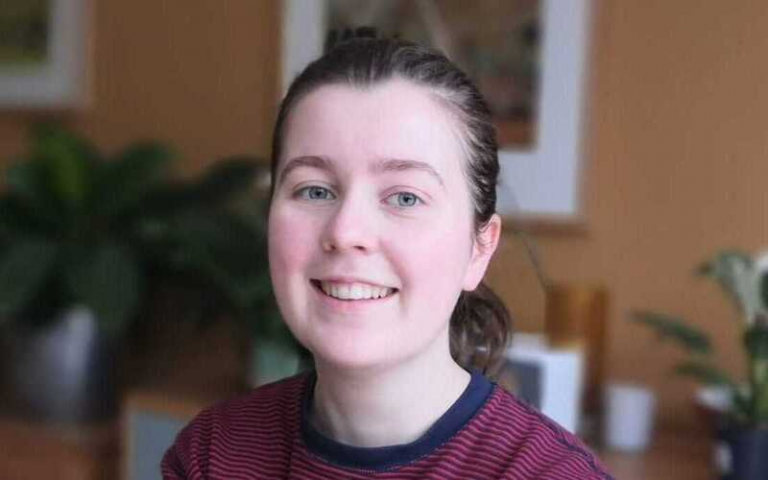Meet our UCL Engineering Student Tutors: Liz Bates, Engineering (Civil) MEng
2 February 2021
In our new series, UCL Engineering hears from some of our wonderful student tutors, who provide one-to-one STEM tutoring sessions for east London schoolchildren. We continue with Civil Engineering student Liz, who says tutoring during COVID-19 is "beyond important."

What does being a UCL Engineering student tutor involve?
It involves a level of commitment to your tutees and a real enjoyment of the subjects you’re teaching! You need to set aside some time weekly to prepare the content you want to go through and have a means of teaching effectively. Before the pandemic, this would have been a mix of discussion and then a related activity. I tried to be as visual as possible and relate it to something else the students already knew or enjoyed. You also need to be consistent and honest about the time you can commit to teaching weekly.
How has being a student tutor helped you?
I think I’ve become a better communicator since becoming a student tutor, and a more organised learner in my own studies too. My degree requires a lot of group work, and considering most of this has been online for the past months, all the tutoring sessions prior to my first online term had really prepared me to be able to efficiently communicate, plan and take notes. It’s also made me feel useful; I remember needing help frequently at school so it’s nice if I can be helpful to a student in that way.
What's the best thing about being a student tutor?
I think it’s been fun to engage with a tutee wh ois at a stage in school that I can remember being in and to have the opportunity to learn some of the content again together. It’s been very rewarding to see my tutee become more confident in their ability and comfortable enough to tell me what aspects of the syllabus they find tough, so we can focus on their personal academic progression. All the students I’ve worked with have been responsive to the sessions and have been lovely to teach and talk with.
How has COVID-19 impacted upon your tutoring?
I had the opportunity to work face-to-face in schools in early 2020, and then to see the transition to online learning as the pandemic began. It was necessary to really change my approach to try and make Zoom classes engaging, and make a connection with the tutee, but this became easier as the weeks continued and we made real progress. My current tutoring set up includes an iPad and a laptop so that I can share my screen with the student and visually explain by drawing and annotating. I think that the on-and-off nature of school over the past term has been quite jarring for students and I’m pleased that through all of the government guideline changes, our online sessions could be consistent to provide some support and academic attention.
[Tutoring has] made me feel useful; I remember needing help frequently at school so it’s nice if I can be helpful to a student in that way."“
What advice would you give to students considering taking part in tutoring/mentoring programmes?
I would fully recommend taking part, even if you can only commit a few hours a week. It’s a genuinely enjoyable job with really positive outcomes for everyone involved.I think what I’ve noticed is helpful is being open and empathetic with your tutees. It’s important to try and understand that there may be other ways of teaching a topic that your tutee might respond to better. I think being able to explain in more than one way and adapt your teaching to the individual student is invaluable, especially if they’re underconfident in the topic.
Why are such tutoring programmes needed?
I think, especially right now, these kinds of programmes are beyond important. The team who organise the meetings and coordinate it all have put so much effort in to offer support to students who need it, giving students confidence that they can understand and enjoy STEM subjects. I think that sometimes schools don’t have enough time to make sure everyone in the class understands each topic before moving on, which can leave some students feeling confused and unhappy. Schemes like this mean that students can get some individual attention and get support specific to them, which I would have found so helpful when I was at school.
Tell us something funny, unexpected or really special that has happened during your tutoring sessions?
A month or so ago, my tutee joined the call and told me immediately that they had been given feedback on a recent exam that day and had got a great mark. To me, exams aren’t everything but in this case, it was a real physical representation of the progress they’d made and I was really pleased for them. I’m glad that they were able to see a really positive outcome to putting in the work and the extra effort they’d made by joining our sessions. It might not sound particularly fun, but it really made my day!
UCL Engineering student tutors are featured on page 6 of the UCL East Engagement Report 2019/20.
With thanks to Dr Elpida Makrygianni and Garance Mourgaud.
Links
Image
- Credit: Liz Bates.
 Close
Close

